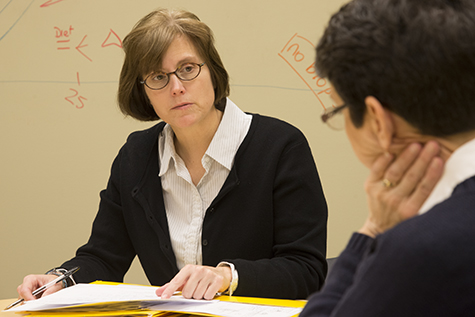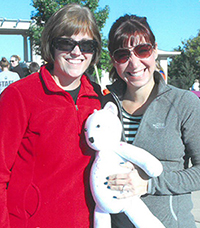in St. Louis. She also is co-founder and director of the Young Women’s Breast Cancer Program for women diagnosed by age 45, at Siteman Cancer Center.
How did you become interested in genetics?
I was inspired by my high school biology teacher when she was teaching meiosis, a process which occurs during the formation of sperm and egg cells. During meiosis, the chromosomes exchange material and create unique combinations. It contributes to our human diversity. When I got into college, I learned about genetic counseling, and that seemed to be a good fit. Ironically, my high school biology teacher graduated from the same program at the University of Cincinnati after I did.
What is genetic counseling, and what role does it play in a patient’s care?
When we see someone with cancer, we ask, “Does he or she have hereditary cancer? Are there other family members at risk? What can we do about it?” Many people in our clinic have very aggressive cancers and may not survive. In that situation, we think about getting information to family members, to possibly help them. If, for example, I see a person with a metastatic sarcoma and she’s going to die, but we don’t know at the genetic level why her family has hereditary cancer, we could store a sample of her DNA. That would be available to her children in the future. Then, if we discover 12 other genes associated with an increased risk for sarcoma, we could test that sample for her children.
Genetic testing confirms a diagnosis at the gene level. We have yet to discover the vast majority of genes that cause hereditary cancer. But when we do find a mutation in a person’s family, other family members can pursue testing. If they have that family mutation and are at higher risk, they might want to consider options for reducing their risk. We’ll help them with understanding the information and coordinating their care.
So you’re treating not just an individual patient but the entire family?
Absolutely. That’s what makes genetics very different from any other type of practice. If you see a surgeon, you’re asking that surgeon to remove a tumor, replace a hip, whatever procedure it might be. In genetics, it’s looking at the care of that individual, as well as how the diagnosis impacts the entire family. So our approach is very different. It’s also very rewarding because of that fact, because you are looking beyond a specific diagnosis, beyond a single person and trying to engage that family in a whole new way. What is rewarding not only for genetic counselors, but also for patients, is they’re taking very positive steps to get answers for themselves that might give them new treatment options. And if it doesn’t, it might give them an answer for their children, siblings and other family members.
It’s a kind of giving on the patient’s part.
It is. It’s very powerful, and it’s not easy. They’re sick, they’re vulnerable in many ways, and they’re concerned about their kids. It is difficult, but I think very powerful, for the people who come in and say, “This is why I’m doing this – to help my children,” and to give their children that gift of information.
What does it mean to you to be able to affect a family’s history in such a meaningful way?
It’s incredibly affirmative and rewarding, and it only happens if we have this collaborative approach – if we’re able to connect with her, if she’s understanding the information, if she’s in agreement. It can be a very different approach than other components of a person’s care. We’re not telling her what to do. We’re trying to inform her so she can make the best decisions. It takes a very holistic, comprehensive approach. It’s looking at the impact on the entire family.
You entered the genetic counseling field in its infancy. Do you feel like you’ve been at the forefront of an increasingly important part of cancer research and care?
When I entered the genetics program in graduate school, cancer genetics really had not taken off. So when I started at Washington University in 1992, I was in the Department of Pediatrics in a general genetics clinic. The clinical use of genetics started in pediatrics. Many of the referrals were children who had birth defects or learning concerns. In the early ’90s, cancer genetics started to take off. At that time, Dr. Alison Whelan, a board-certified internist and clinical geneticist, was completing her genetics fellowship, and that’s where I met her. She wanted to run an adult genetics clinic, a type of clinic which still isn’t common today. I’ve been incredibly lucky to work with Alison. Most of the geneticists around the country are pediatricians, not internists. We’re very fortunate at Siteman Cancer Center because we have someone in Dr. Whelan who takes care of adults, understanding the approach for treating adult diseases, in contrast to a pediatrician thinking about adult-onset cancers.
Tell us about research with which you’re affiliated.
I work with Paul Goodfellow, PhD (formerly of Washington University, now at The Ohio State University) on a study to identify new genetic risk factors among young women who have been diagnosed with breast cancer. We know, for example, about 10 genes associated with a very high risk for breast cancer, but most of the genetic risk factors associated with breast cancer have yet to be identified. I’m also a collaborator on a study led by Kim Kaphingst, an associate professor at the School of Medicine. She’s evaluating young breast cancer survivors’ communication preferences regarding whole genome sequencing – how they would want the results of their own sequencing communicated to them, when and what types of information they would want. At Washington University School of Medicine, the push is to move to whole genome sequencing, in which a person’s entire genetic makeup is analyzed. Consider a person with colon cancer, and whole genome sequencing is performed. An inherited gene mutation associated with colon cancer is not found, but the gene for early-onset dementia is. Do you want to know that information? And when do you want to know it? The challenge with whole genome sequencing is we obtain a great deal of information that we can’t yet interpret. It’s incredibly complex. The technology is so advanced, we need to catch up with an understanding of how best to work with families who receive this type of information.
You’re also director of the Young Women’s Breast Cancer Program. How does the disease affect young women differently?
If you think about a 30-year-old woman, for example, with breast cancer and who has 1- and 3-year-olds, she’s about 30 years younger than the average woman diagnosed with breast cancer. She’s taking care of young kids. She might be gearing up her career. It’s a very different life stage. Also, breast cancer in younger women tends to be aggressive. As a result, young women have the lowest survival rates. Women who are thinking about having children are considering steps to preserve that option before they enter into chemotherapy. You can imagine some of the body changes through surgery and chemotherapy. They may start menopause prematurely, or the changes may impact their sexuality. Because of their diagnosis, they’re more likely to have hereditary cancer, so they’re thinking about their kids. All of these factors make it very different for younger women. They want to meet with a peer group that understands a diagnosis at their particular life stage.
What are your interests outside of work?
I love the Cardinals, and that has caused some angst in my family because I grew up in Cincinnati with the Big Red Machine. But how can you not love the Cardinals? It’s fun to go to games and be a part of a city that loves baseball.
Also, I’m learning tennis. It’s a lot of fun because you’re outside, it’s social and it’s something you can do the rest of your life. There’s a fundraiser for the Young Women’s Breast Cancer Program called Celebrate Tennis, and the women who run it have taken me on as one of their teaching projects.
I’m the blessed “auntie” to two kids, age 9 and 11, who are children of a friend. Talk about taking the stress away. You spend time with them and remember what it’s all about. They play tennis better than I do.
I also volunteer at church and at the “Celebrate Events” fundraisers that benefit different Siteman programs. The volunteers for the Celebrate Events are incredibly generous with their time and money and really wish to make a difference for people with cancer.
I also just finished Orange is the New Black, a book about a woman who spent a year in prison and the relationships she built. I knew little about the prison system, and this book reminded me of the humanity that I think is often lost when we discuss our justice system.
Is there a common thread through your professional and personal interests? It seems you’re focused on helping the vulnerable.
I am interested in social justice, and I think this concept is incorporated in our work and community life. People with rare genetic conditions, young adults with cancer, families who are poor — they are all vulnerable and at risk for a variety of reasons. Helping individuals to have a voice and to develop services is of interest to me.
And the tennis helps me get through the day.


